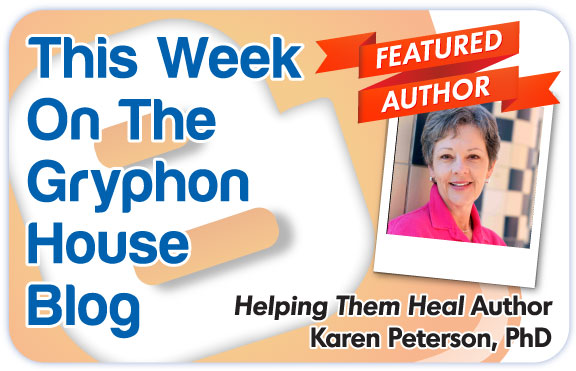It's hard to know what goes on in a student's life at home. But while there are many stressful factors outside of the classroom, an educator can control what goes on inside the classroom. We were able to catch up with Gryphon House author Dr. Karen Peterson to discuss her new book, Helping Them Heal. The book hits on answers, ideas, and specific classroom strategies to move trauma-affected children in positive directions. To find out what you can do to create a safe classroom environment for children experiencing stress and trauma, check out Karen's interview below:
Q1. Generally, when speaking of stress for adults, the first things that come to mind are work, bills, family, etc. What types of stress and/or trauma affect children?
A1: Stress for children is fundamentally a negative, physical, sensory experience. Significant stressors for children center on disruptions of their relationships with parents/grandparents/primary care providers…whether from abuse, neglect, illness/death, mental instability, and/or family dysfunction. These relationships are also greatly affected by conditions that surround children. Poverty, crime and violence, environmental disasters (both large and small), significant changes in routines (moving, having multiple/inconsistent child care arrangements), and living in chaotic/disorganized environments are all stressors for children.
Q2. There are a lot of activities and tips in your book. Will they benefit all the children in the classroom or only the ones who appear to be negatively affected by stress or trauma?
A2: Absolutely. While their negative experiences may alter their capacity to enjoy and benefit from the everyday positive experiences, stress-affected children are still “children first.” Creating a sense of community, building self-regulation and competence skills are essential best practice ideas for any classroom.
Q3. How did you become interested in studying stress and trauma in children?
A3: Having worked in a variety of early childhood settings, I have seen the impact of stress on a wide range of children. In every environment I have experienced children who have been affected by stress (and trauma in some cases) from routine anxiety to reactions so severe they required intense intervention. Understanding the widespread presence of stress was the initial reason I became interested. The second incentive was my exposure to the compelling research on complex trauma (adverse childhood experiences) and its impact on adult mental and physical health outcomes. Significant stress in childhood is not limited to the time of childhood but can and does have life-long consequences.
Q4. What is Helping Them Heal's most important takeaway?
A4: There are three important messages:
- Understand that children’s responses to stress are reactions to physical stimuli. Their resulting behaviors are ways they have found (regardless of the behavior’s negativity or effectiveness) to cope with what has and is happening to them. These responses are symptoms, not intentional, planned, or highly sophisticated attempts to manipulate others.
- Children cannot “unlearn” their use of personal coping strategies nor can they “think their way out” of being stressed without adult assistance. Adults must provide interventions with multiple approaches that seek to change the physical sensations as well as the personal/social experiences the child has had with stress/trauma.
- It is going to take time, patience, and understanding to help children manage the impact of stress. Stress management and reduction is a long-term process and caring adults can make a remarkable difference.
For more practical tips and strategies for working with stress-affected children, pick up your copy of Helping Them Heal and start the children in your classroom on the path to healing today.
Biography: Karen L. Peterson, PhD, is a professor of early childhood in the Department of Human Development, Washington State University, Vancouver, with 25 years of experience as a program director and child development specialist.
Jenna Roby
A graduate of High Point University, Jenna Roby served as marketing specialist for Gryphon House from 2013-2015.
